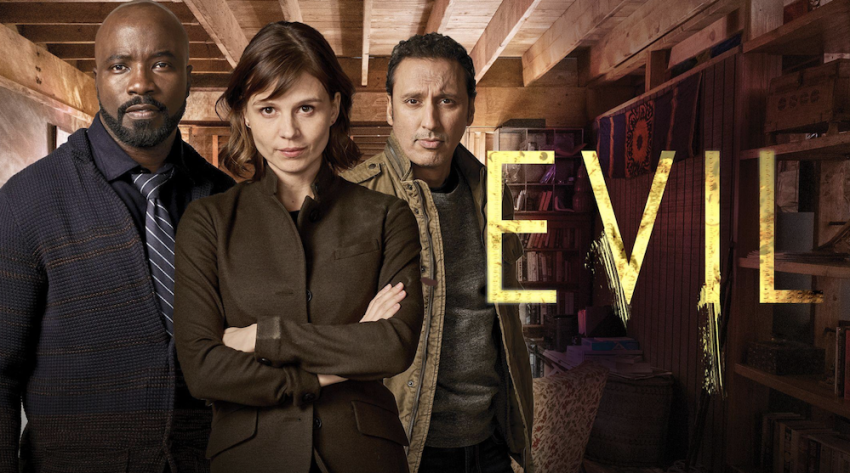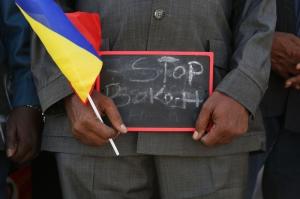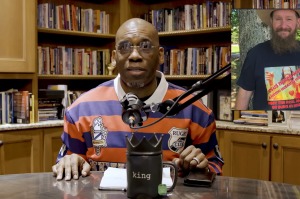Creators of CBS' ‘Evil’ say new series explores demonic possession, miracles and prophecy

The creators of CBS' new psychological drama “Evil” say their aim is to give viewers a glimpse into the supernatural and explore unexplained occurrences through science and religion.
“The series focuses on a skeptical female psychologist who joins a priest-in-training and a carpenter as they investigate the Catholic Church’s backlog of unexplained mysteries, including supposed miracles, demonic possessions and hauntings. Their job is to assess if there’s a logical explanation or if something truly supernatural is at work,” the synopsis reads.
Actors Mike Colter (‘Luke Cage”), Katja Herbers (“Manhattan”), Aasif Mandvi (“The Proposal”), and Michael Emerson (“Person of Interest”), are part of the star-studded cast.
The following is an edited transcript of The Christian Post's interview with Robert and Michelle King, the husband and wife creators of “Evil” who reveal how their different beliefs inspired the new series that starts on Sunday.
CP: Where did the idea for this TV show come from?
Michelle: The idea for the show really came out of a conversation that Robert and I have been having for the last 30 years. That is, we both recognize that there's evil around us but we don't necessarily see it coming from the same place. Robert, who's a devout Catholic, explains it through religion. I, as a secular Jew, am far more likely to see it coming from psychological issues.
Robert: I think what we wanted to do was have an exciting genre show. So there would be a thrill. But it's really about the chemistry between the three lead [actors] and how very different people could work together and help each other understand why do people do bad things.
CP: Talk about the importance of people working together despite their differences, especially in a "cancel culture" where people today cancel each other out for having different beliefs or ideas.
Michelle: That was one of the most important things we wanted to underline as we were creating the show, which is we wanted people with very strong beliefs that were different from each other but that could listen to each other and be respectful of each other. Because it feels as though there's a lot of disagreement in the world that is not respectful and does not involve listening.
Robert: I think what helps for the show is they're dealing with very challenging information like "why do people do bad things? Are there miracles in the world? Is their prophecy?" And they come at it from trying to figure out whether something can be considered scientific, explainable through empirical means, or is it something that's beyond empiricism and therefore, either unexplained, as the character Kristen would determine, or something that is miraculous, as David would define it.
CP: How have the actors reacted to this theme of science versus the supernatural?
Michelle: I think they were all intrigued by the theme and characters that they haven't played before, that it was something a little bit new for them. I believe they found that exciting.
CP: Robert, we see in the first episode where a rosary is used for protection and the reciting of the Lord's Prayer. Were these things that you drew from your own belief and faith, in believing that there's power in prayer when it comes to encountering evil?
Robert: Oh, yeah. I think you'll even find it more in the second episode. It's something I believe. The last thing I want in entertainment is to shove things down people's throat. What I love are the works of Flannery O'Connor and Graham Greene, where Catholicism, in that case, or religion, are just part of the fabric of the story, they're not like, "Oh, you have to believe what I believe for this story to make sense to you."
I think part of it is seeing some of the things through Kristen's eyes, who's a nonbeliever, and she's a little alienated and yet she works through it because she sees that maybe there's a way to talk to this guy that I don't believe the same thing he does, and vice versa.
I love the fact that religious people who are strong believers really can understand the science involved in, for example, quantum mechanics or something like that. They don't see it as completely irrelevant to their lives. They see it as a way to understand the world God has made. So to me, it's just wanting to be part of the fabric of the world.
CP: Michelle, did the collaboration and writing for this series open up your understanding of what your husband believes?
Michelle: I've never been not open to what Robert believes. We have a unique partnership, you don't keep going for 30 plus years without that. For instance, I don't fast during Lent but if Robert and I are apart, I'll be the first one to text him to remind him that he isn't eating meat on Friday. So we work together.
Robert: I think for me, part of religion is the discipline of it. So that is one place where I'm probably not proselytizing Michelle that much, but you always want to be living the disciplined aspect of your faith, so I guess I do that. I think we found a good working relationship, and what's helpful with this kind of show is that there's a way to write that through to put it in the lives of the characters you're inventing.
CP: What will the faith-based audience get from a show like this, especially with a title like "Evil'?
Michelle: I actually am concerned that people might get scared by the title. But that said, I do believe that if anyone were to watch an episode, they would recognize that religion is being treated with a lot of respect. So often on TV, people who are religious or have religious ideals are patronized or made villainous, and we're doing just the opposite.
Robert: For my part, why I think people should watch it and get past the title is this show is really about both sides of the question. The second episode is about miracles. There's an episode that is completely asking, "Is there a prophecy post-revelation, post-New Testament?"
I think some of these questions are interesting and challenging, and shouldn't be separated from entertainment. I think the purpose of entertainment is to not just satisfy but to challenge, and I think there's some challenging questions about miracles that are not binary that are just, "are there miracles or are there not?"
But if there are miracles, what do you do when you don't receive one? I have a family that was very sick, who are the holiest people I know; I couldn't think of people who are more deserve of miracles than anyone else in the world. So why is a miracle not available there but is available somewhere else? That's a question from someone of faith. So I do think people of faith may want to tune in to the show because it addresses those conflicts in the show and addresses issues of faith in a complex way.
The second episode goes into the idea of prayer. The Michael Emerson character who's this demonic presence appears in David's head as he's praying, and just distracts him. And I think people who pray, one of the biggest problems with it is not boredom or anything, it's purely how do you focus as you pray? So I do think, in an entertainment mold, there is a lot to find there if people work past the title.



























